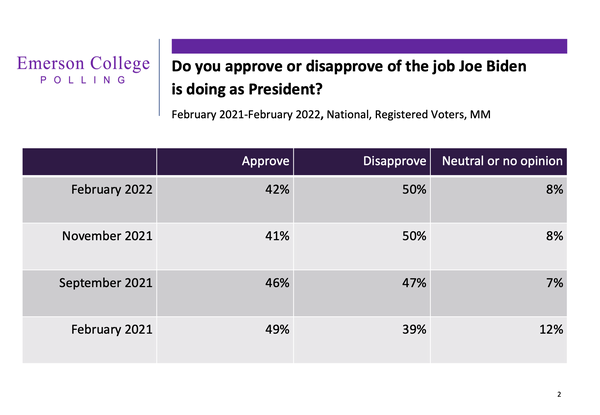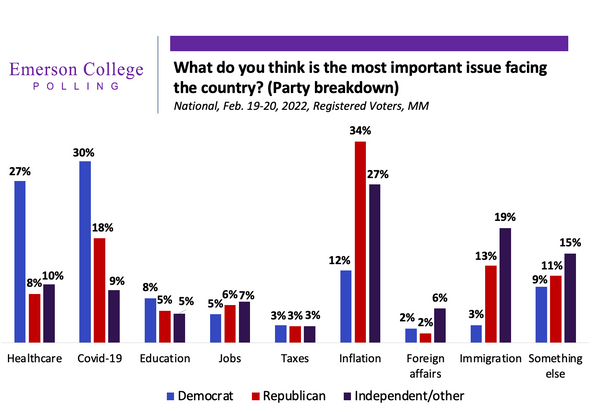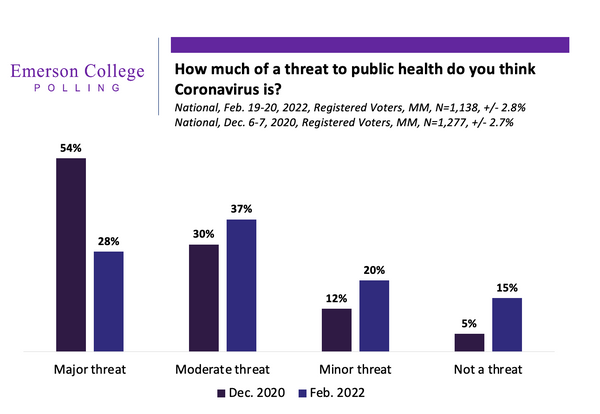A new Emerson College national poll shows President Biden’s job approval underwater: 42% approve of the job he is doing as president while 50% disapprove; 8% are unsure. This is a slight increase in approval from November 2021, when 41% approved of Biden's job performance and 50% disapproved.
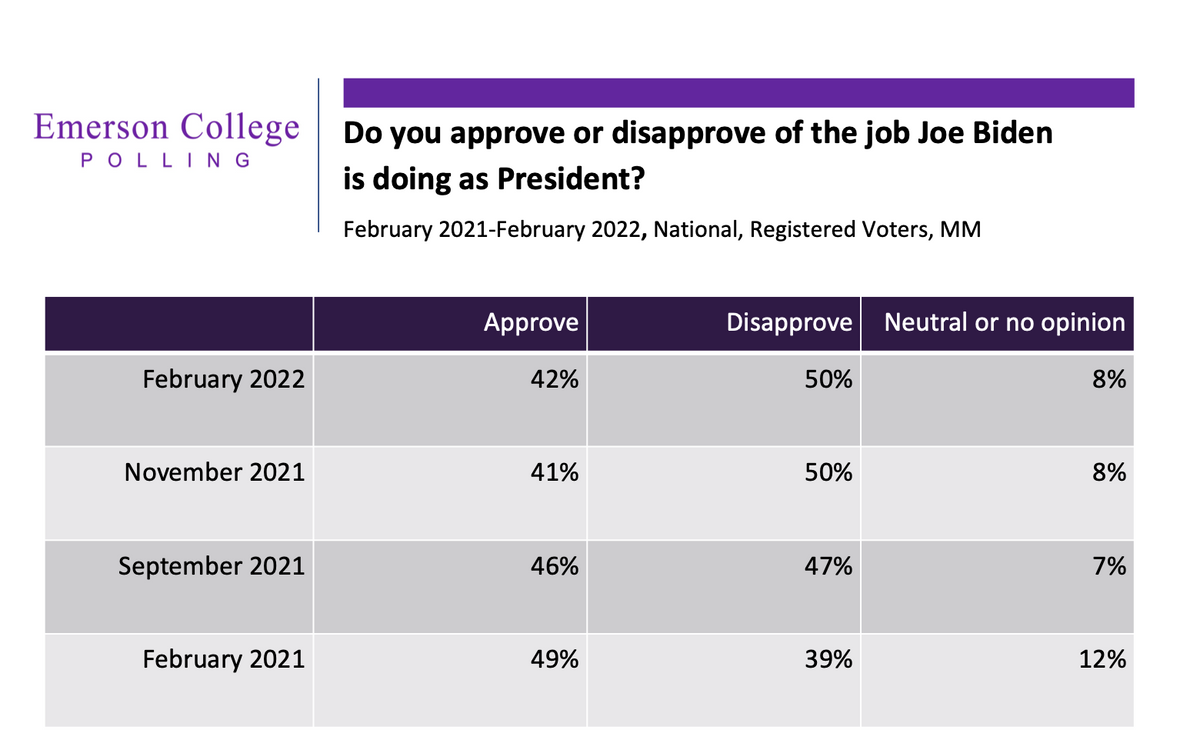
Spencer Kimball, Executive Director of Emerson College Polling, notes: “in the last year, President Biden has watched his job approval get turned upside down from +10 to -8; however, there has been little movement in his job performance since November 2021, suggesting he has steadied his base, of course only time will tell.”
Hispanic voters are most critical of Biden’s job performance: only 35% approve while 56% disapprove. White voters are more favorable of Biden’s job performance: 41% approve and 51% disapprove. Black voters are the most favorable of Biden’s job performance: 66% approve while 28% disapprove.
Within the Democratic party, 73% approve of the job Biden is doing as president while 19% disapprove. Among Republicans, the majority (71%) disapprove while 22% approve. Independents also generally disapprove of Biden’s job, at 27% approve and 63% disapprove.
Inflation is seen as the most important issue facing the country among a plurality (24%) of voters. Covid-19 follows with 20%, closely followed by healthcare with 16%, and immigration with 11%. Education and jobs were the top issue for 6% of voters, respectively, and taxes and foreign affairs with 3% apiece. Twelve percent (12%) report “something else;” and when these voters specified their top issue, the most common responses included climate change, crime, and income inequality.
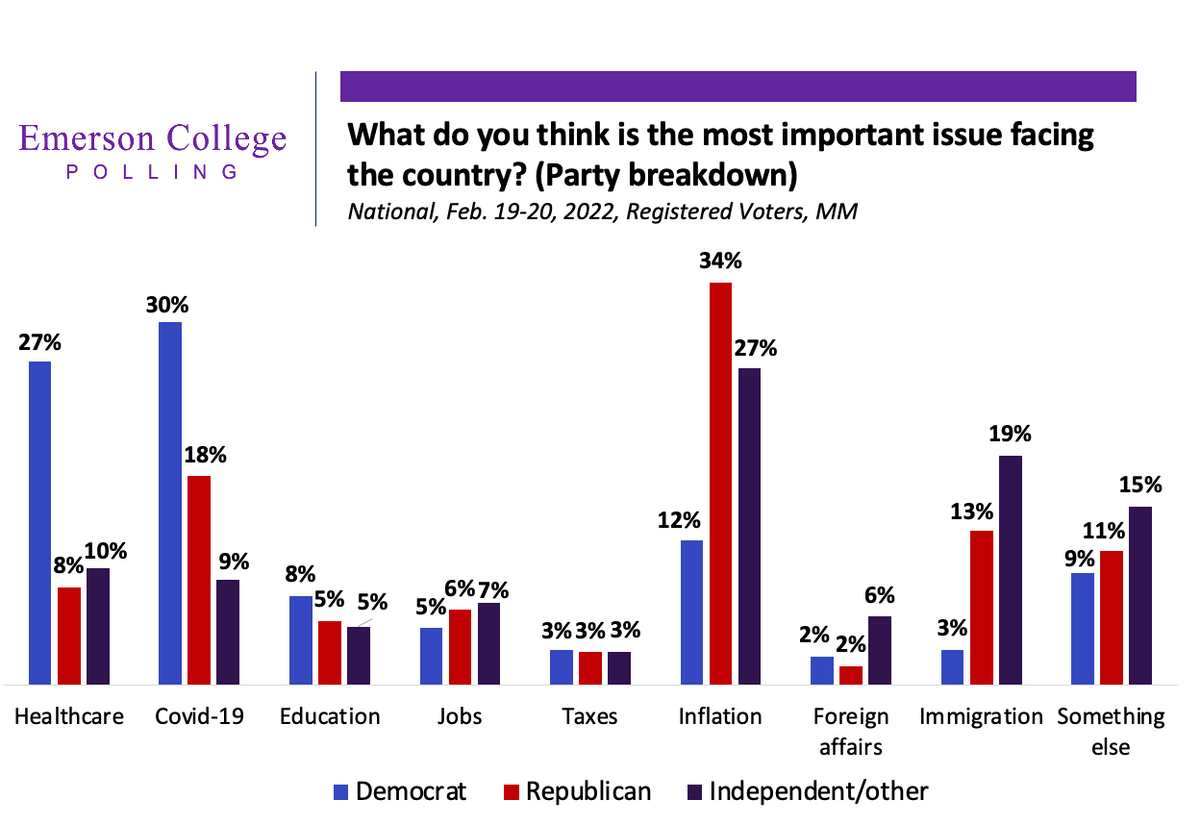
Kimball notes: “Despite widespread attention on Russia-Ukraine tensions, domestic issues are at the forefront of the US voters’ mind. Independents are falling in line more with Republicans, prioritizing inflation, whereas Democratic voters see Covid-19 and healthcare as the top issue facing the nation.”
Inflation is the most important issue for Republican (34%) and Independent (27%) voters, compared to only 12% of Democratic voters. The top issue for Democratic voters is split between Covid-19 (31%) and healthcare (27%).
Among those under 50, the plurality (27%) say Covid-19 is the most important issue facing the nation. Among those over 50, the plurality (28%) say inflation is the most important issue facing the nation.
The top issue for Hispanic voters is inflation (33%) followed by healthcare (20%), compared to white voters, where inflation (23%) and Covid-19 (19%) are the top issues. Among Black voters, a plurality (26%) say Covid-19, while 16% say inflation. Asian voters (43%) are most likely to rank Covid-19 as the most important issue facing the country.
The majority (73%) of registered voters report being very motivated to vote in the 2022 midterm elections. Republican voters express higher levels of motivation to vote than Democrats: 79% say they are very motivated to vote compared to 65% of Democratic voters. Younger voters are less motivated to vote: 57% of voters between the ages 18-29 say they are very motivated to vote, compared to 84% of voters over 50 who say they are very motivated to vote.
Voters were asked which congressional candidate on the ballot they would be most likely to vote for in the midterms, the Democratic candidate or the Republican candidate. Half of voters (50%) say they plan to vote for the Republican candidate, while 41% say they plan to vote for the Democratic candidate; 9% are undecided. This is similar to the November national poll, which had Republican candidates nationwide leading Democratic candidates 49% to 42%.
In a hypothetical 2024 match up, former President Donald Trump is at 48% and President Biden is at 44%: a two point change from November where Trump was ahead 45% to 43%. Both poll results are within the polls margin of error.
Voters are split on the level of threat Covid-19 presents to public health in the US: 28% say Covid-19 is a major threat, 37% say it is a moderate threat, 20% say it is a minor threat, and 15% find it not to be a threat at all. This compares to December 2020, when a majority (54%) of voters categorized Covid-19 as a major threat, and only 17% found it to be a minor threat or not a threat.
“Public perception of Covid-19 has shifted, voters now perceive Covid-19 as less of a major threat to public health. While portions of Democrats find Covid-19 to be a major threat and Republicans find it to be a minor threat, the plurality of Democratic, Republican, and Independent voters believe Covid-19 is a moderate threat to public health,” Emerson College Polling Director of Communications Camille Mumford says.
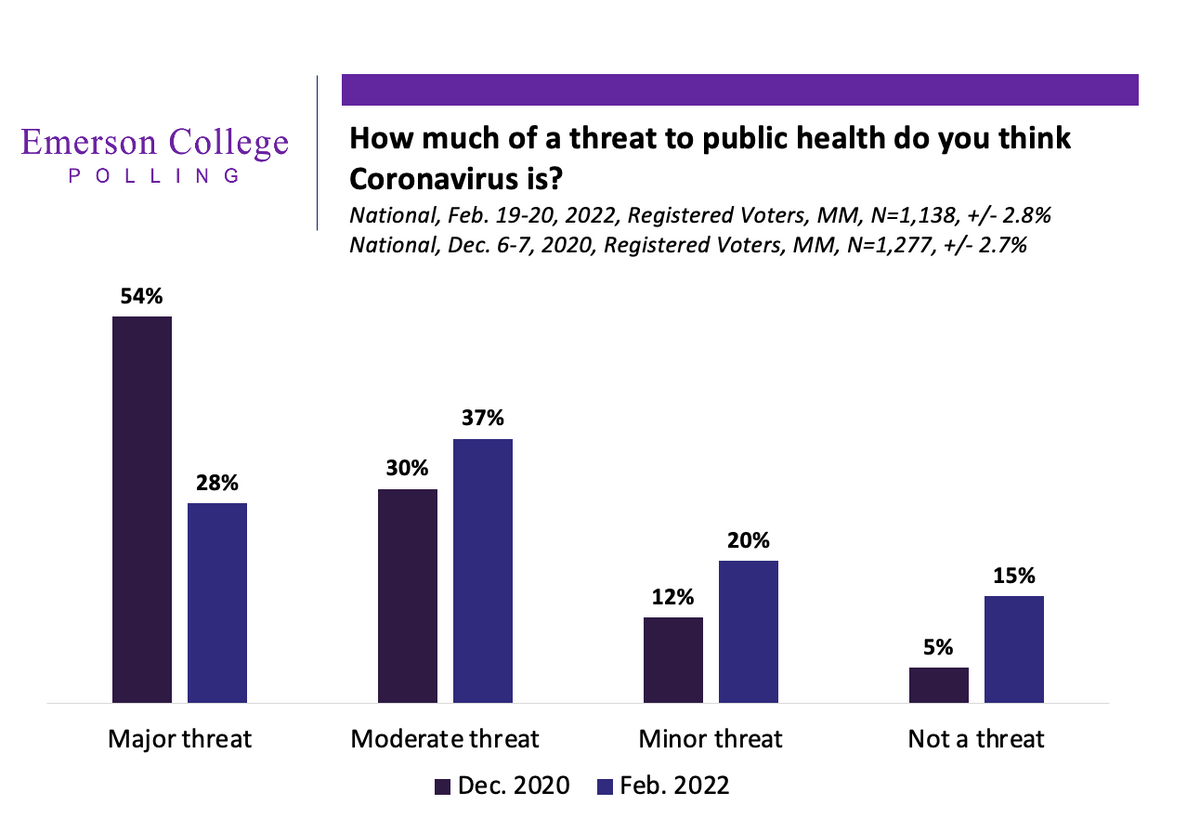
Regarding media consumption, a plurality (36%) of voters rely on cable news for their political information. Among these voters, Fox News was rated as the most relied upon news channel by 48% of voters, 21% rely on CNN, 17% on MSNBC, eight percent on Newsmax, five percent CNBC and two percent report relying on One American News (OAN).
Social media follows cable news for voters’ political information source at 24%. Among these voters, 32% find social media posts from cable news outlets as the most credible source on social media, whereas 23% find posts from friends and family to be the most credible, 18% find traditional print media such as the New York Times and Wall Street Journal to be most credible, 17% find political pundits most credible source, and lastly 10% find political organizations the most credible source.
Lastly regarding media consumption, 15% rely on local television and 13% rely on national newspapers as their most credible place for political information.
Within the survey, a split half study was created to test the difference, if any, between respondents when presented with differing wording on the question on election integrity:
- Do you believe your state runs secure elections?
- Do you believe your state runs fair elections?
No statistically significant difference was found between the two questions: 59% say they believe their state runs secure elections, while 61% say their state runs fair elections.
- “Secure elections”
- Independents: 52% yes / 26% no / 23% unsure or no opinion
- Republicans: 47% yes / 25% no / 28% unsure or no opinion
- Democrats: 76% yes / 15% no / 9% unsure or no opinion
- “Fair elections”
- Independents: 66% yes / 22% no / 13% unsure or no opinion
- Republicans: 49% yes / 30% no / 21% unsure or no opinion
- Democrats: 70% yes / 21% no / 9% unsure or no opinion
According to Emerson College Polling’s Director of Survey Operations Isabel Holloway, a difference was found between party affiliations: “The topline chi-square test showed no statistically significant difference between the wording options among the entire voting population. However, when Independents were singled out, the chi-square test showed a significant difference, with Independents being more likely to disagree with election security than election fairness.”
Caller ID
The Emerson College February national poll was conducted February 19-20, 2022. The sample consisted of registered voters in the United States, n=1,138 with a Credibility Interval (CI) similar to a poll’s margin of error (MOE) of +/- 2.8 percentage points. The data sets were weighted by age, education, race, and region based on 2020 turnout modeling. It is important to remember that subsets based on gender, age, party breakdown, ethnicity, and region carry with them higher margins of error, as the sample size is reduced. Data was collected using a cellphone sample of SMS-to-web, an online panel provided by Amazon MTurk, and an Interactive Voice Response (IVR) system of landlines.
Follow along @EmersonPolling

